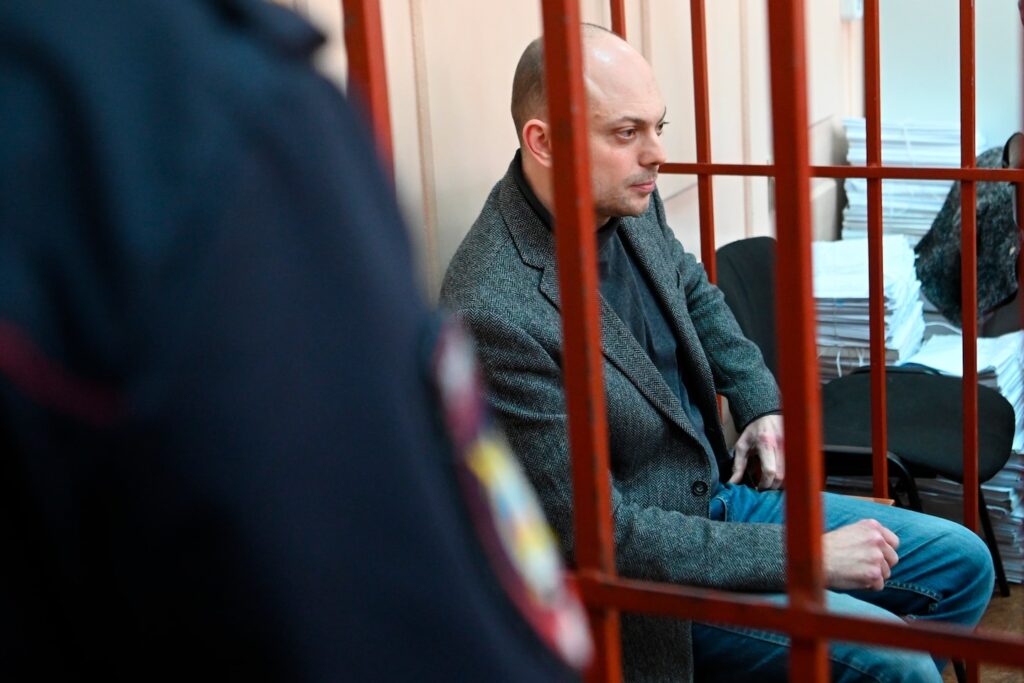Omsk, Russia, Penal Colony No. 6 — Solitary confinement in a Siberian maximum security prison is unremarkable. The only distractions I get here (and the welcome escape from my cell) are periodic court appearances via video link from the prison office. One might naturally ask how someone already serving a 25-year sentence could possibly make it to court, but it seems the Russian government hasn't forgiven me yet.
Every month, a couple of polite officials from the Russian government censorship agency Roskomnadzor come to visit me and hand me a summons to appear before an administrative court for violating Russia’s “foreign agents” law. They tell me that every message I receive from prison or that my colleagues post on my social media must be accompanied by a disclaimer in capital letters: “Made by a Foreign Agent.” And I always reply, just as politely, that I am a Russian politician, not a “foreign agent,” and that I have no intention of engaging in self-denigration. I told the (aptly named) Soviet District Court exactly the same, and the court kindly granted me an administrative conviction. On June 11, the court handed me a third summons, paving the way for the authorities to bring a new criminal case against me for “violating the foreign agents law.”
 Follow this authorOpinion of Vladimir Kara-Murza
Follow this authorOpinion of Vladimir Kara-Murza
Attempting to smear political opponents as “agents of foreign powers” is an old Soviet tactic, one of many adopted by Vladimir Putin's regime. During Stalin's great-scale state terror, this label led to millions of people being sent to concentration camps or condemned to death. (This included my great-grandfather and great-great-grandfather, who were executed as “Latvian agents” – both were posthumously fully rehabilitated and exonerated of all charges.) In the post-Stalin era, Soviet state propaganda did its best to portray dissidents, including such notable figures as Andrei Sakharov and Aleksandr Solzhenitsyn, as puppets of the West.
Under Putin, the practice was revived with the passage of the first “foreign agents” law after the massive pro-democracy protests of 2011 and 2012. The Kremlin claimed it was simply following the example of the US Foreign Agents Registration Act, but this analogy was clearly flawed from the start. Unlike the US law, which focused on political lobbying “at the command, request, or direction or control of a foreign actor,” Putin’s measure targeted anyone who engaged in a vaguely defined “political activity” and, crucially, did not link foreign funding to specific actions. (The concept of a “foreign actor” did not exist at all.) Moreover, the definition of “foreign funding” included almost anything. Opposition activists and groups have been called “foreign agents” for paying taxi fares, transferring airline miles, and even using Western online payment systems such as PayPal.
After the full-scale invasion of Ukraine in 2022, Putin signed a new law that makes financial aid completely unnecessary. This allows the Ministry of Justice to label as a “foreign agent” anyone who it considers to be “under foreign influence” – in fact, any public figure who speaks against the Kremlin. I was designated as a “foreign agent” in April 2022 (simultaneous with my arrest) for speaking out against the war in Ukraine and calling Putin a war criminal. This was the official reason given by the Ministry of Justice when I challenged the designation in court. The Russian government's “Register of Foreign Agents” currently includes more than 800 organizations and individuals, including Russia's best living novelists Lyudmila Ulitskaya and Boris Akunin, legendary rock musicians Andrei Makarevich and Boris Grebenshikov, renowned poet and literary critic Dmitry Bykov, and Nobel Peace Prize winner Dmitry Muratov.
Frankly, this is more of an honor list than a blacklist. But the blacklisting is real. Individuals designated as “foreign agents” are barred from engaging in a variety of activities, including teaching, organizing public events, conducting anti-corruption audits, monitoring elections, and advertising on social media. Not to mention more informal bans, such as banning “foreign agent” books from bookstores and libraries.
The amendments signed by Putin last month ban “foreign agents” from taking part in elections or holding public office at any level. Traditional authoritarian tactics such as electoral fraud are no longer necessary in Russia. The government can now simply label opponents as “foreign agents” and immediately remove them from the ballot and from parliament. One of the first people to have their seat stripped under this law will be Boris Vishnevsky, a long-time member of the St. Petersburg Legislative Assembly and deputy leader of the liberal Yabloko party who was recently blacklisted for his anti-war stance.
But perhaps the most insulting requirement of the “foreign agents” law is that you must sign yourself with an official immunity clause, something not even the Soviet KGB could have dreamed up. Those who refuse face administrative and then criminal prosecution. This is why I meet regularly with the Soviet regional courts. My criminal trial here in Omsk will likely begin in the fall. Of course, the outcome is well known. It seems my current 25-year sentence is not the limit. But on the positive side, it will increase the chances of getting out of prison, which is a blessing.



